英语写作:汉语和英语五大区别
汉语与英语的区别and相同点
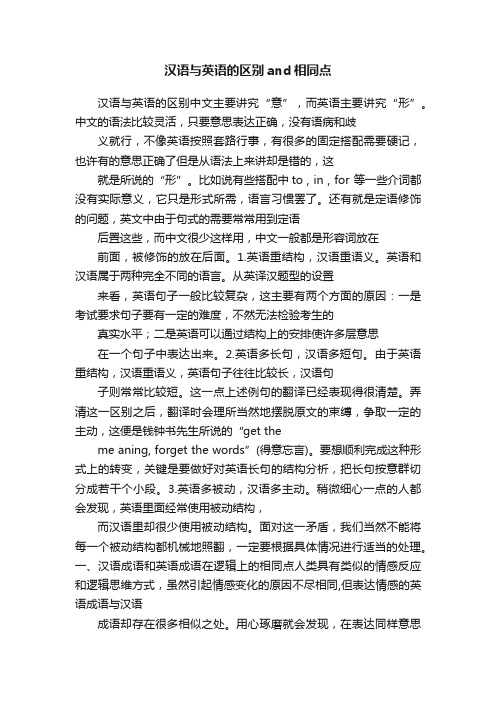
汉语与英语的区别and相同点汉语与英语的区别中文主要讲究“意”,而英语主要讲究“形”。
中文的语法比较灵活,只要意思表达正确,没有语病和歧义就行,不像英语按照套路行事,有很多的固定搭配需要硬记,也许有的意思正确了但是从语法上来讲却是错的,这就是所说的“形”。
比如说有些搭配中to , in , for 等一些介词都没有实际意义,它只是形式所需,语言习惯罢了。
还有就是定语修饰的问题,英文中由于句式的需要常常用到定语后置这些,而中文很少这样用,中文一般都是形容词放在前面,被修饰的放在后面。
1.英语重结构,汉语重语义。
英语和汉语属于两种完全不同的语言。
从英译汉题型的设置来看,英语句子一般比较复杂,这主要有两个方面的原因:一是考试要求句子要有一定的难度,不然无法检验考生的真实水平;二是英语可以通过结构上的安排使许多层意思在一个句子中表达出来。
2.英语多长句,汉语多短句。
由于英语重结构,汉语重语义,英语句子往往比较长,汉语句子则常常比较短。
这一点上述例句的翻译已经表现得很清楚。
弄清这一区别之后,翻译时会理所当然地摆脱原文的束缚,争取一定的主动,这便是钱钟书先生所说的“get theme aning, forget the words”(得意忘言)。
要想顺利完成这种形式上的转变,关键是要做好对英语长句的结构分析,把长句按意群切分成若干个小段。
3.英语多被动,汉语多主动。
稍微细心一点的人都会发现,英语里面经常使用被动结构,而汉语里却很少使用被动结构。
面对这一矛盾,我们当然不能将每一个被动结构都机械地照翻,一定要根据具体情况进行适当的处理。
一、汉语成语和英语成语在逻辑上的相同点人类具有类似的情感反应和逻辑思维方式,虽然引起情感变化的原因不尽相同,但表达情感的英语成语与汉语成语却存在很多相似之处。
用心琢磨就会发现,在表达同样意思的时候,虽然所使用的词汇或比拟的事物不同,但表达了相同或相似的意思,这也使我们在理解英语成语的时候有章可循。
英语写作汉语和英语五大区别
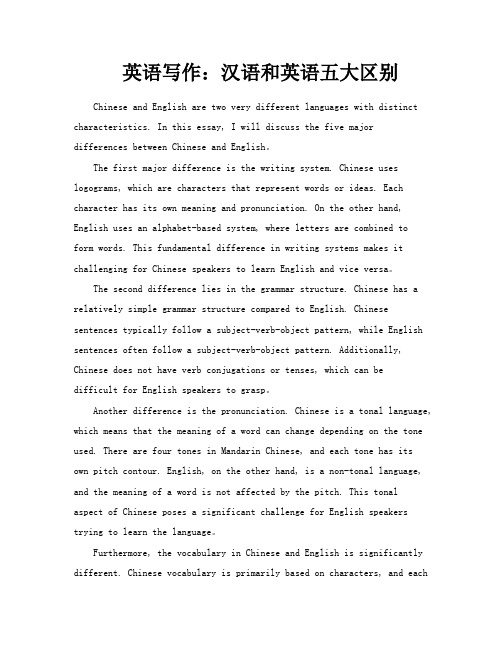
英语写作:汉语和英语五大区别Chinese and English are two very different languages with distinct characteristics. In this essay, I will discuss the five majordifferences between Chinese and English。
The first major difference is the writing system. Chinese uses logograms, which are characters that represent words or ideas. Each character has its own meaning and pronunciation. On the other hand, English uses an alphabet-based system, where letters are combined toform words. This fundamental difference in writing systems makes it challenging for Chinese speakers to learn English and vice versa。
The second difference lies in the grammar structure. Chinese has a relatively simple grammar structure compared to English. Chinese sentences typically follow a subject-verb-object pattern, while English sentences often follow a subject-verb-object pattern. Additionally, Chinese does not have verb conjugations or tenses, which can bedifficult for English speakers to grasp。
英语和汉语的十大区别
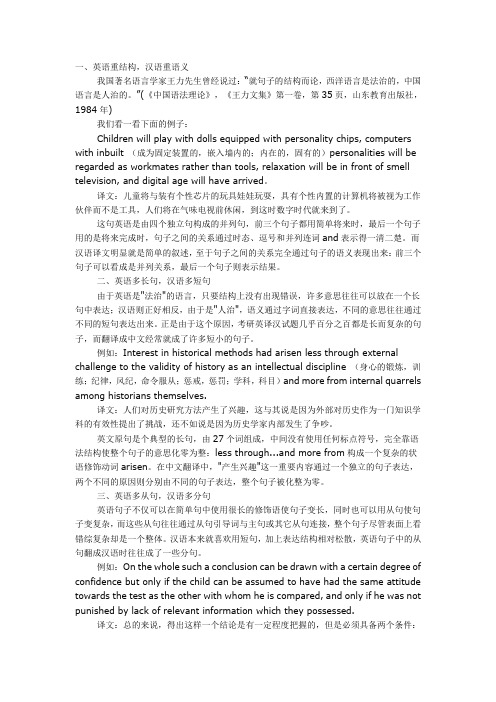
一、英语重结构,汉语重语义我国著名语言学家王力先生曾经说过:“就句子的结构而论,西洋语言是法治的,中国语言是人治的。
”(《中国语法理论》,《王力文集》第一卷,第35页,山东教育出版社,1984年)我们看一看下面的例子:Children will play with dolls equipped with personality chips, computers with inbuilt (成为固定装置的,嵌入墙内的;内在的,固有的)personalities will be regarded as workmates rather than tools, relaxation will be in front of smell television, and digital age will have arrived。
译文:儿童将与装有个性芯片的玩具娃娃玩耍,具有个性内置的计算机将被视为工作伙伴而不是工具,人们将在气味电视前休闲,到这时数字时代就来到了。
这句英语是由四个独立句构成的并列句,前三个句子都用简单将来时,最后一个句子用的是将来完成时,句子之间的关系通过时态、逗号和并列连词and表示得一清二楚。
而汉语译文明显就是简单的叙述,至于句子之间的关系完全通过句子的语义表现出来:前三个句子可以看成是并列关系,最后一个句子则表示结果。
二、英语多长句,汉语多短句由于英语是"法治"的语言,只要结构上没有出现错误,许多意思往往可以放在一个长句中表达;汉语则正好相反,由于是"人治",语义通过字词直接表达,不同的意思往往通过不同的短句表达出来。
正是由于这个原因,考研英译汉试题几乎百分之百都是长而复杂的句子,而翻译成中文经常就成了许多短小的句子。
例如:Interest in historical methods had arisen less through external challenge to the validity of history as an intellectual discipline (身心的锻炼,训练;纪律,风纪,命令服从;惩戒,惩罚;学科,科目)and more from internal quarrels among historians themselves.译文:人们对历史研究方法产生了兴趣,这与其说是因为外部对历史作为一门知识学科的有效性提出了挑战,还不如说是因为历史学家内部发生了争吵。
中文 英文 作文 区别
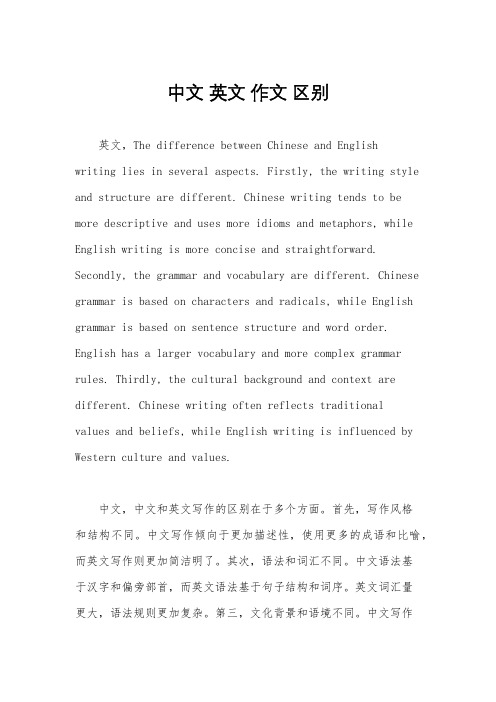
中文英文作文区别英文,The difference between Chinese and Englishwriting lies in several aspects. Firstly, the writing style and structure are different. Chinese writing tends to be more descriptive and uses more idioms and metaphors, while English writing is more concise and straightforward. Secondly, the grammar and vocabulary are different. Chinese grammar is based on characters and radicals, while English grammar is based on sentence structure and word order. English has a larger vocabulary and more complex grammar rules. Thirdly, the cultural background and context are different. Chinese writing often reflects traditionalvalues and beliefs, while English writing is influenced by Western culture and values.中文,中文和英文写作的区别在于多个方面。
首先,写作风格和结构不同。
中文写作倾向于更加描述性,使用更多的成语和比喻,而英文写作则更加简洁明了。
其次,语法和词汇不同。
中文语法基于汉字和偏旁部首,而英文语法基于句子结构和词序。
英语写作与汉语写作重要区别

英语写作与汉语写作重要区别
英语写作与汉语写作在很多方面存在重要区别。
以下是其中一些主要区别:
1.语法结构:英语的语法结构与汉语不同。
英语是一种主谓宾的语言,即主语通常在句子的主要位置,而汉语的语序比较灵活,可以根据语境调整词语的位置。
2.词汇表达:英语和汉语的词汇表达方式也存在差异。
英语通常更加简洁直接,使用较少的形容词和副词来描述事物。
而汉语则更为丰富,可以使用更多的形容词和修饰性词语来表达细节。
3.修辞手法:英语写作更注重修辞手法的运用。
比如,使用比喻、夸张、对比等手法来增加文章的表现力和说服力。
而汉语写作则更注重写实和直接表达。
4.文化背景:英语和汉语的文化背景不同,因此在写作中需要注意不同文化背景对表达方式的影响。
例如,在英语写作中,强调个人观点和直接表达被视为正常,而在中文写作中,往往更注重客观陈述和间接表达。
5.审美标准:英语写作和汉语写作在审美标准上也存在差异。
英语写作注重逻辑思维和结构的合理性,追求简洁、明了和逻辑通顺。
而汉语写作更注重意境和修辞的美感,喜欢运用象征、比喻、双关等手法来丰富作品的艺术性。
在进行英语写作时,需要注意以上差异,并灵活运用英语的语法结构和修辞手法,同时注意与读者的文化背景和审美标准相契合。
论汉语语法与英语语法差异

论汉语语法与英语语法差异汉语和英语是两种不同的语言,它们在语法结构上存在一些差异。
以下是汉语和英语语法之间的一些主要差异:1. 词序顺序:汉语的基本词序是主谓宾,而英语的基本词序是主谓宾或主宾谓。
换句话说,在一个简单的句子中,汉语的单词排序是主语 + 谓语 + 宾语,而英语的单词排序可以是主语 + 宾语 + 谓语或者主语 + 谓语 + 宾语。
2. 冠词:英语有冠词(a、an、the),用来表示名词的特定性质。
而汉语没有冠词系统,不需要使用冠词。
3. 时态:汉语的时态表示可以通过词语以及句子的上下文来推断,而英语则使用动词的时态来表示动作发生的时间。
汉语中的动词不会根据时态的变化而改变。
4. 动词时态和语态:英语有多种动词时态和语态,如一般现在时、一般过去时、进行时、完成时以及被动语态等。
在汉语中,动词的时态和语态通常由上下文来指示。
5. 名词复数:英语中,名词的复数形式使用复数形态变化,而汉语中没有复数形式,可以通过量词来表示数量。
6. 代词:汉语的代词没有性别和数的区分,而英语的代词有性别和数的区分。
在英语中,男性用"he"表示,女性用"she"表示,而在汉语中使用相同的代词"他"。
7. 形容词和副词的位置:在英语中,形容词通常放在名词之前,而在汉语中,形容词通常放在名词之后。
副词在英语中通常放在动词之前,而在汉语中通常放在动词之后。
8. 定语从句:在英语中,定语从句是由关系代词(如who、which、that)引导的,并且通常位于被修饰的名词之后。
在汉语中,定语从句通常是由关系词(如的、之、之一)引导的,并且位于被修饰的名词之前。
英汉语言十大差异
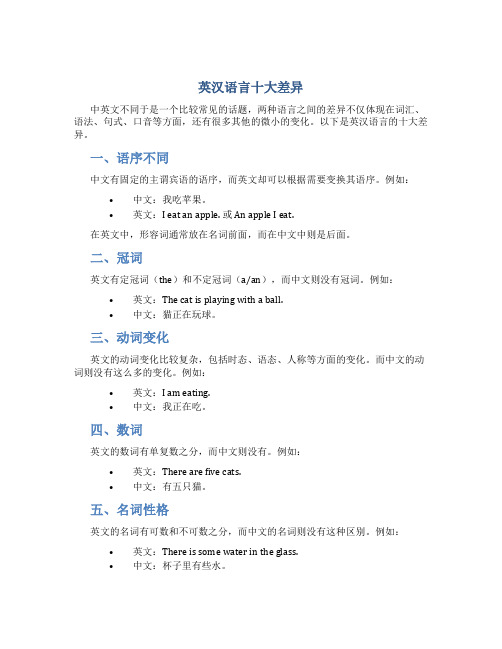
英汉语言十大差异中英文不同于是一个比较常见的话题,两种语言之间的差异不仅体现在词汇、语法、句式、口音等方面,还有很多其他的微小的变化。
以下是英汉语言的十大差异。
一、语序不同中文有固定的主谓宾语的语序,而英文却可以根据需要变换其语序。
例如:•中文:我吃苹果。
•英文:I eat an apple. 或 An apple I eat.在英文中,形容词通常放在名词前面,而在中文中则是后面。
二、冠词英文有定冠词(the)和不定冠词(a/an),而中文则没有冠词。
例如:•英文:The cat is playing with a ball.•中文:猫正在玩球。
三、动词变化英文的动词变化比较复杂,包括时态、语态、人称等方面的变化。
而中文的动词则没有这么多的变化。
例如:•英文:I am eating.•中文:我正在吃。
四、数词英文的数词有单复数之分,而中文则没有。
例如:•英文:There are five cats.•中文:有五只猫。
五、名词性格英文的名词有可数和不可数之分,而中文的名词则没有这种区别。
例如:•英文:There is some water in the glass.•中文:杯子里有些水。
六、代词英文的代词种类较多,包括主、宾、物主等。
而中文的代词比较简单。
例如:•英文:He gave me his book.•中文:他把他的书给了我。
七、词汇用法两种语言的词汇用法也有所不同。
例如:•英文:He is interested in music.•中文:他对音乐很感兴趣。
八、语气两种语言的语气表达方式也有一些差异。
例如:•英文:Could you help me, please?•中文:请你能帮助我吗?九、拟声词中文的拟声词较多,而英文则相对较少。
例如:•中文:咕咚(水声)•英文:drip(滴水声)十、表达感情中文在表达感情时比较直白,而英文则更为委婉。
例如:•中文:我爱你。
•英文:I love you. 或者 I adore you.总的来说,中英文之间有很多差异,这些差异反映了不同文化的不同特点。
举例说明现代汉语语法和英语语法的区别

举例说明现代汉语语法和英语语法的区别
现代汉语语法和英语语法在很多方面存在差异。
以下是一些例子:
1. 词序:汉语中的词序比较灵活,常常可以根据需要调整词语的顺序来表达不同的意思。
而英语语法对词序有严格的规定,如主语一般位于动词之前。
汉语例句:我今天去了超市。
英语翻译:I went to the supermarket today.
2. 动词时态:汉语的动词时态表达相对简单,通常只需通过上下文来确定动作的时间。
而英语则有更多的时态形式,如过去式、进行时、将来时等。
汉语例句:他正在吃饭。
英语翻译:He is eating.
3. 名词复数和冠词:英语中名词有单数和复数形式,并且需要使用冠词来修饰。
而汉语中名词一般没有明确的单复数形式,也不需要使用冠词。
汉语例句:我有两个朋友。
英语翻译:I have two friends.
4. 代词的指代:英语中的代词需要明确指代先前提到的名词,而且有人称、数和性别的变化。
而汉语的代词相对较少,不需
要明确指代的信息。
汉语例句:他喜欢看电影。
英语翻译:He likes watching movies.
5. 句子的从句结构:英语中经常使用从句来表达复杂的句子结构,如条件从句、目的从句等。
而汉语中从句的使用相对较少。
汉语例句:如果下雨,我就不去。
英语翻译:If it rains, I won't go.
需要注意的是,以上只是一些典型的例子,实际上现代汉语语法和英语语法还有很多其他的不同之处。
- 1、下载文档前请自行甄别文档内容的完整性,平台不提供额外的编辑、内容补充、找答案等附加服务。
- 2、"仅部分预览"的文档,不可在线预览部分如存在完整性等问题,可反馈申请退款(可完整预览的文档不适用该条件!)。
- 3、如文档侵犯您的权益,请联系客服反馈,我们会尽快为您处理(人工客服工作时间:9:00-18:30)。
二、英语多长句,汉语多短句
• 英语只要结构上没有出现错误,许多意思 往往可以放在一个长句中表达;汉语则正 好相反,语义通过字词直接表达,不同的 意思往往通过不同的短句表达出来。
• 例如:Interest in historical methods had arisen less through external challenge to the validity of history as an intellectual discipline (身心的锻炼,训练;纪律,风纪, 命令服从;惩戒,惩罚;学科,科目)and more from internal quarrels among historians themselves.
• 例如:On the whole such a conclusion can be drawn with a certain degree of confidence but only if the child can be assumed to have had the same attitude towards the test as the other with whom he is compared, and only if he was not punished by lack of relevant information which they possessed
• And it is imagined by many that the operations of the common mind can by no means be compared with these processes and that they have to be required by a sort of special training。 • 译文:许多人认为,普通人的思维活动根本无法 与科学家握。 • 原文中有三个被动语态is imagined, be compared 和be required,译成汉语都变成了主动表达:认 为、相比和掌握。
英语写作: 英语写作:汉语和英语五大关 键区别
一、英语重结构,汉语重语义
• 例子:
• Children will play with dolls equipped with personality chips, computers with inbuilt (成为固定装置的,嵌入墙内的;内在的,固有 的)personalities will be regarded as workmates rather than tools, relaxation will be in front of smell television and digital age will have arrived.
• 有些英语被动需要把主语译成汉语的宾语,这样 才能更加符合中文的表达习惯。 • 例如:New sources of energy must be found, and this will take time, but it is not likely to result in any situation that will ever restore (归还;恢复, 复兴;恢复健康,复原)that sense of cheap and plentiful energy we have had in the past time。 • 译文:必须找到新的能源,这需要时间;而过去 我们感觉到的那种能源价廉而充足的情况将不大 可能再出现了
• 译文:人们对历史研究方法产生了兴趣, 这与其说是因为外部对历史作为一门知识 学科的有效性提出了挑战,还不如说是因 为历史学家内部发生了争吵。
• 英文原句是个典型的长句,由27个词组成, 中间没有使用任何标点符号,完全靠语法 结构使整个句子的意思化零为整:less through...and more from构成一个复杂的状 语修饰动词arisen。在中文翻译中,"产生 兴趣"这一重要内容通过一个独立的句子表 达,两个不同的原因则分别由不同的句子 表达,整个句子被化整为零。
四、英语多代词,汉语多名词
• 英语不仅有we、you、he、they等人称代词, 而且还有that、which之类的关系代词,在 长而复杂的句子,为了使句子结构正确、 语义清楚,同时避免表达上的重复,英语 往往使用很多代词。汉语虽然也有代词, 但由于结构相对松散、句子相对较短,汉 语里不能使用太多的代词,使用名词往往 使语义更加清楚。
五、英语多被动,汉语多主动
• 英语比较喜欢用被动语态,科技英语尤其 如此。汉语虽然也有"被"、"由"之类的词表 示动作是被动的,但这种表达远没有英语 的被动语态那么常见,因此,英语中的被 动在汉译中往往成了主动。
• • • • • • • • •
一组常用被动句型的汉译: It must be pointed out that.。。必须指出…… It must be admitted that.。。必须承认…… It is imagined that.。。人们认为…… It can not be denied that.。。不可否认…… It will be seen from this that.。。由此可知…… It should be realized that.。。必须认识到…… It is (always) stressed that.。。人们(总是)强调…… It may be said without fear of exaggeration that.。。可以 毫不夸张地说……
三、英语多从句,汉语多分句
• 英语句子不仅可以在简单句中使用很长的 修饰语使句子变长,同时也可以用从句使 句子变复杂,而这些从句往往通过从句引 导词与主句或其它从句连接,整个句子尽 管表面上看错综复杂却是一个整体。汉语 本来就喜欢用短句,加上表达结构相对松 散,英语句子中的从句翻成汉语时往往成 了一些分句
• 译文:儿童将与装有个性芯片的玩具娃娃 玩耍,具有个性内置的计算机将被视为工 作伙伴而不是工具,人们将在气味电视前 休闲,到这时数字时代就来到了。
• 这句英语是由四个独立句构成的并列句, 前三个句子都用简单将来时,最后一个句 子用的是将来完成时,句子之间的关系通 过时态、逗号和并列连词and表示得一清二 楚。而汉语译文明显就是简单的叙述,至 于句子之间的关系完全通过句子的语义表 现出来:前三个句子可以看成是并列关系, 最后一个句子则表示结果。
• 例句:There will be television chat shows hosted by robots, and cars with pollution monitors that will disable them when they offend。 • 译文:届时,将出现由机器人主持的电视 访谈节目及装有污染监测器的汽车,一旦 这些汽车污染超标(或违规),监测器就会使 其停驶。
• 译文:总的来说,得出这样一个结论是有 一定程度把握的,但是必须具备两个条件: 能够假定这个孩子对测试的态度和与他相 比的另一个孩子的态度相同;他也没有因 缺乏别的孩子已掌握的有关知识而被扣分。
• 原文中两个only if引导的从句显然使整个句 子变得很复杂,可是由于有并列连词but和 and,整句话的逻辑关系十分清楚:…能够 得出结论…但是只要…而且只要…。从上 面的译文我们可以看出,为了使中文表达 更加清楚,but only if...and only if.。。首先 提纲挈领:但是必须具备两个条件……, 这种做法给我们的感觉是译文中没有从句, 有的只是一些不同的分句。
